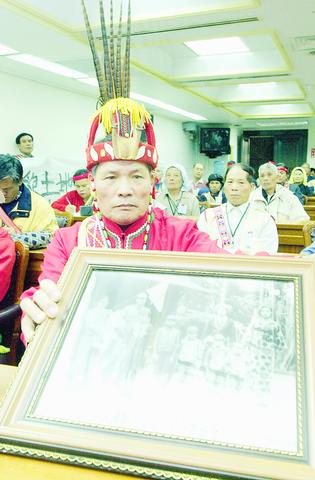Aboriginal representatives yesterday made a plea at a public hearing to demand the return of lands appropriated by the government in the Hualien County area.
Forty Amiss tribal chiefs and elders took part in the public hearing to press their claim to 622 hectares that is currently owned by the Taiwan Sugar Corp.

PHOTO: CHIANG YING-YING, TAIPEI TIMES
The public hearing, entitled "Return-My-Land," was sponsored by legislator Payen Talu (
Representatives from Taiwan Sugar, the Council of Aboriginal Affairs, the Legislative Yuan's bureau of legal affairs and the Association of Taiwan Indigenous People's Politics (ATIPP) were also represented at the meeting.
The 622-hectare area has undergone extensive development since it was appropriated and hosts three ethnic-Chinese villages: Da-hsing, His-fu and Fu-yuan.
Historical precedent
"The land historically has belonged to us," said Aaung Nouw Ay Jiyeuss, an Amiss spokesperson. "The Taiwan Sugar Corp received the land from the outside forces who came and took away our land without seeking our consent."
Jiyeuss was referring to the Japanese colonial period from 1895 to 1945 during which tribal peoples were forced to live in mountainous areas.
The colonial government appropriated thousands of hectares of tribal land in order to exploit forest, mineral and agricultural resources.
"When the KMT came to Taiwan in 1949, it received the lands from the Japanese and continued the occupation and exploitation of them by claiming them as government property," said Aaung Nouw Ay Jiyeuss.
Amiss elders present said that as a result, tribal peoples were forced to abandon their land and to live in mountainous areas.
Huang Jorn-hun (黃哲宏), vice president of Taiwan Sugar Corp, said that "the company is willing to negotiate over the matter, though the fact remains that it did gain ownership of the land in accordance with the law."
However, the Amiss disagreed.
"We don't recognize Taiwan Sugar Corp's ownership of the land because the law has been created according to the values of the Han people which have neither incorporated nor acknowledged Aborigines," Aaung Nouw Ay Jiyeuss said.
A legal matter
Huang Nuan-fang (
"No matter what, in a legal fight, Taiwan Sugar Corp is regarded having full ownership of the land," Huang said.
Siao Shih-hui (
"Compiling sufficient background information concerning the land will be difficult," said Chang Chen-jorn (
Most Amiss tribal members live in the mountainous areas around Hualien. It is the largest, with 150,000 members, of the nine Aborigine tribes that still exist in Taiwan.
In total approximately 400,000, or 1.65 percent of Taiwan's 23 million people claim Aboriginal decent. Most Aborigines live in scatter settlements and small villages in the most remote areas of the country's east and southeast.

CHAOS: Iranians took to the streets playing celebratory music after reports of Khamenei’s death on Saturday, while mourners also gathered in Tehran yesterday Iranian Supreme Leader Ayatollah Ali Khamenei was killed in a major attack on Iran launched by Israel and the US, throwing the future of the Islamic republic into doubt and raising the risk of regional instability. Iranian state television and the state-run IRNA news agency announced the 86-year-old’s death early yesterday. US President Donald Trump said it gave Iranians their “greatest chance” to “take back” their country. The announcements came after a joint US and Israeli aerial bombardment that targeted Iranian military and governmental sites. Trump said the “heavy and pinpoint bombing” would continue through the week or as long

TRUST: The KMT said it respected the US’ timing and considerations, and hoped it would continue to honor its commitments to helping Taiwan bolster its defenses and deterrence US President Donald Trump is delaying a multibillion-dollar arms sale to Taiwan to ensure his visit to Beijing is successful, a New York Times report said. The weapons sales package has stalled in the US Department of State, the report said, citing US officials it did not identify. The White House has told agencies not to push forward ahead of Trump’s meeting with Chinese President Xi Jinping (習近平), it said. The two last month held a phone call to discuss trade and geopolitical flashpoints ahead of the summit. Xi raised the Taiwan issue and urged the US to handle arms sales to

State-run CPC Corp, Taiwan (CPC, 台灣中油) yesterday said that it had confirmed on Saturday night with its liquefied natural gas (LNG) and crude oil suppliers that shipments are proceeding as scheduled and that domestic supplies remain unaffected. The CPC yesterday announced the gasoline and diesel prices will rise by NT$0.2 and NT$0.4 per liter, respectively, starting Monday, citing Middle East tensions and blizzards in the eastern United States. CPC also iterated it has been reducing the proportion of crude oil imports from the Middle East and diversifying its supply sources in the past few years in response to geopolitical risks, expanding

Pro-democracy media tycoon Jimmy Lai’s (黎智英) fraud conviction and prison sentence were yesterday overturned by a Hong Kong court, in a surprise legal decision that comes soon after Lai was jailed for 20 years on a separate national security charge. Judges Jeremy Poon (潘兆初), Anthea Pang (彭寶琴) and Derek Pang (彭偉昌) said in the judgement that they allowed the appeal from Lai, and another defendant in the case, to proceed, as a lower court judge had “erred.” “The Court of Appeal gave them leave to appeal against their conviction, allowed their appeals, quashed the convictions and set aside the sentences,” the judges